Sorted by date Results 1 - 25 of 133
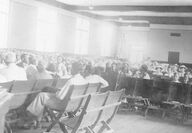
Schools and education have always been a prime concern in the Canoe area. According to Annie Waters, History of Escambia County, a log school was constructed early in Canoe's history. Records show that by 1894 there were three schools in operation with an enrollment of 80 pupils. The schools in that long ago era were famous for their teachers, and Canoe had a true colony of teachers throughout much of her history whereby education and culture was passed from one generation to the next. In the...
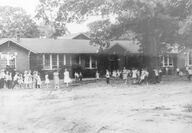
The local schools around Canoe have always played a major role in the community. Centers of social interaction, cultural events, music and education could all describe the island of benefits of a school in a small community set in a sea of agriculture and forests. Looking back one hundred years at Canoe's schools show what was important to the student body and the area at the time. Many of the students enrolled at the time would go on to see the Roaring Twenties, the Great Depression, World War...
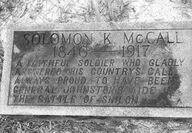
The War Between the States proved a dividing line in American history, one which is still being crossed, drawn and re-crossed even today. Whereas many would seek to view that era through a modern lens, those who fought for their state, and the South, take a different view. One such different view might have been found in Private S.K. McCall of Monroe County, Alabama. McCall was born in Bainbridge, Georgia on May 29, 1841. He ended up in Monroe County where he joined Company D, of the 3rd...
As history passed by the grave of Alexander Bolivar Cromartie in the Canoe Canaan Freewill Cemetery, his descendants continued to live in the small town of Canoe, Alabama. One of his daughters married into the Mixon family. The family ran a store in Canoe. Many would remember this store as being built for the purposes of being a bank around 1913. Yet the bank was short lived and the building was used as a school annex and later the Mixon Grocery. The Mixon’s son, Emmett Leonard Mixon Jr., would have grown up during the Great Depression and a va...
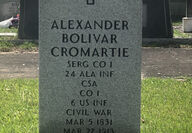
The years between 1861-65 were a trying time for those involved in the War Between the States. Adding to the turmoil was the misery experienced by those in captivity on both sides of the Blue and the Gray. Among the worst prisoner of war camps was Camp Douglas, Illinois which was located in what is today's Chicago city limits. In late December 1862, a very young Monroe County lad by the name of Private John William McKinley was captured at the Battle of Murphysboro and sent to the camp. In those...
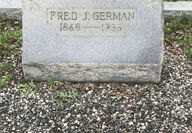
Canaan Freewill Cemetery, located on the western extremes of Canoe, contains the gravestones of many early Canoe residents. Contained in the cemetery are the stories of young men who died fighting our nation's wars, mothers who died in childbirth and many others who simply passed due to old age and the passage of time. Yet in one area of the cemetery, the headstone of Fred German modestly states his time on Earth but the story of the visionary, settler and farmer who moved to a now forgotten...
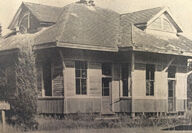
Trains and the railroad have always been a big part of Canoe. The earliest recordation of the presence of a depot in the Canoe area may be a blip in The Standard Gauge, a Brewton, Alabama newspaper which noted on December 8, 1898; " A nice new depot is nearing completion at Canoe." North of Canoe, the Alger Sullivan logging railroad ran through the woods around Seizmore and Big Escambia Creek. The exact date of construction of the original depot in Canoe is lost to the fog of history but The...

Sometimes old landmarks from the past leave an impression. Among the various images of places and things I remember from the Canoe of my childhood was the sign on the old block building at the caution light which read "Weldery." In an earlier time the building had been Stallworth's Hardware, and to another generation of Canoe residents the old sign "Guns and Coffins" on the front of the building served as a sign that you were in old Canoe. John Conn had an office there as did Mr. Barnett in a...
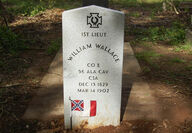
How a society deals with death and remembrance says a lot about the nation as a whole and our society is unwinding daily. As the War Between the States closed, and many wanted to put away any memory of this great national sadness, organizations began to emerge in the South to retrieve the Southern dead from far flung battlefields and honor them. The Ladies Memorial Association (LMA) arose to establish chapters around the South for the purpose of retrieving the dead and reinterring them in...
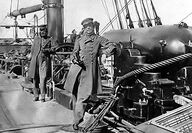
American society is in free-fall. Nevermind we are enduring a pandemic the likes of which hasn't been seen in a century, but we are also confronted with riots, looting, protests and the chaotic scream of voices on the national level that drown out any logic or reason or dialoge between participants. Let me set it straight right out of the gate, I oppose what happened to George Floyd. Furthermore, I oppose violence, brutality, corruption, cronyism, nepotism and a host of other "isms," in our...
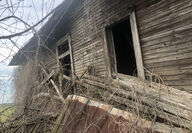
As the War Between the States raged through the nation, the Federal government in Washington, DC struggled with running the day to day affairs of a nation which was ripping itself apart on battle fields that stretched from the Potomac River to the Rio Grande. During this era Congress and the President managed to pass one remarkable piece of legislation; The Homestead Act, on May 20, 1862. The act allowed an adult, over age 21, male or female, to claim 160 acres of land from the public domain....
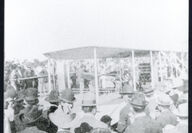
Aviation's golden age saw much excitement in the small towns of America. Barnstormers, daredevils and the wide open skies called to thrill seekers everywhere and many of these took to the air. It was into this age of exploration that Flomaton and Century found an early footnote in history. According to an article in Biloxi's Coastal Breeze newspaper, a transcontinental flight, which had started in California, left Biloxi after refueling on January 10, 1912 about 1pm. R.G. Fowler was the pilot...
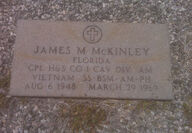
During an era when the President of the United States did not apologize for being American, the United States made war against North Vietnam. Beginning in 1965 American involvement in the war escalated dramatically and over the next ten years a variety of political actors and theories moved across the stage of this international drama. Jack Elliott Clemmons left Atmore, Alabama along with his best friend and other young men by bus in August 1965 bound for the Vietnam War. As the sparkling...
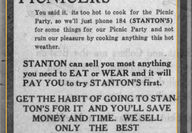
The Great War, also known as World War I, was a pivotal event in the lives of the generation which fought the war. No other war had been fought with such savagery and loss of life. Technology was ahead of the tactics used on the battlefield to such a degree that cavalry charges were often met with machine gun fire which viciously cut short the life of horse and rider. In the small hamlet of Canoe, Alabama, the war seemed distant to the residents. The small town was in its golden age and the flow...
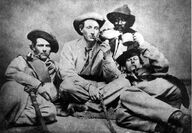
Spring brings about thoughts of gardening, farming, outside activities and other iconic images of the season. However, it is important to remember that for many of us, the memory of the sacrifices of our ancestors become very relevant in the April and May time of year. In April 1865, and for more than a week following the fall of Richmond, the Army of Northern Virginia under General Robert E. Lee, attempted to outrun, outfight, and outmaneuver the numerically superior forces of Union General...

The early 1960s was a different world than our modern, pandemic stricken time. Memories of World War II and Korea were still fresh in the minds of Americans as news coverage of a distant land called Vietnam began to take up more of Walter Cronkite's CBS Evening News during the decade. Locally it might have looked a lot like the movie Stand By Me in that the events of South East Asia and Europe seemed far removed from Canoe, Alabama. Meanwhile, in the basement of the Atmore Post Office, the...

World War II saw the rapid mobilization of the US economy to fight the threat of the Axis in Europe and the Pacific. Such radical changes in the national economy tightened the food supply and basic supplies such as tires, hardware and other goods which consumers were used to finding on the shelves of hardware and grocery stores in their hometowns soon disappeared. The need for raw materials and food for the far flung American armed forces led to the rationing system. This system was implemented...
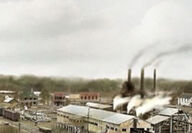
Sawmills during the age of the "Big Cut" could be wild places. A sea of humanity ebbed and flowed through the mills. Laborers, foremen, businessmen and suppliers all created unique personalities inside this great ocean of industry which was dotted with small archipelagos of plainer mills, ripping saws and other industrial apparatus stations dotting the landscape. These were places where men earned an honest days wage. It was hot work in the summer and cold work in the winter; and it was...

Gardening is as much a part of being a Southerner as weekend football games and a trip to one's favorite fishing hole. Yet in another era, gardening was a survival tool and the Federal government encouraged US citizens to plant gardens everywhere. Even local railroad companies encouraged its workers to plant gardens along the tracks. Vegetable gardens have always been in the arsenal of preppers in the South going back to the early frontier of the 1700s. The items produced in the garden was...
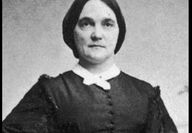
Wars can destroy not just the lives of the people directly involved on the battlefield but the people left on the home front as well. During the War Between the States many loved ones were separated by not only by the geographic distance between them but by death and destruction. Some of the greatest figures in that war were destined for heartbreak. General John Bell Hood is one example. Hood had a reputation for bravery and aggressiveness that sometimes bordered on recklessness. Arguably one of...
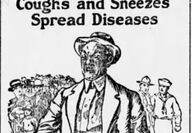
As mentioned in last week's article, the Corona virus is historic in its sweeping across the globe. The virus carries with it the potential for untold consequences in the infection of potentially millions and many deaths to follow. Yet the virus is not the first time in history that a pandemic has occurred. Looking back at history is the best way to learn what worked and what did not work in earlier occurrences and it also provides a way to learn how to prepare for what may be coming. The...

For those who think history boring, or not worth teaching or studying perhaps they should take a look at history's lessons when it comes to the growing pandemic known as the Corona virus, also known as Covid-19. As horrible as the potential outcomes may be, the lessons of another pandemic 100 years ago may offer lessons which could prevent, or at least slow transmissions. By November 1918 World War I was at an end. As many a war-weary family prepared to welcome their soldier home, a new invasion...
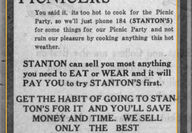
In the old days, meaning that time before the early 1960s, when many of the tiny communities in our area seemed to prosper and their residents had more of a home view than a world view, there existed small places like Malta and Dugout which had a big influence on farming and industry. The exact origin of the name 'Dugout' is clouded in the fog of history but some say it comes from a train wreck that "dug out" a hill or from a dirt pit which operated there at the time of the construction of...
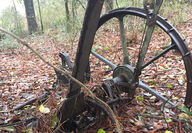
Military dispatches provide an important reflection of the significance of a geographic area during a war. The importance of Canoe Station as a military base and supply point is illustrated through the military dispatches exchanged by various commanders, on both sides, during the War Between the States. The coming of the Mobile and Great Northern Railroad in the 1850s provided commercial and transportation links to the backwoods of rural Alabama and in the process, the numerous small rail stops...

Military dispatches provide an important reflection of the significance of a geographic area during a war. The importance of Canoe Station as a military base and supply point is illustrated through the military dispatches exchanged by various commanders, on both sides, during the War Between the States. The coming of the Mobile and Great Northern Railroad in the 1850s provided commercial and transportation links to the backwoods of rural Alabama and in the process, the numerous small rail stops...